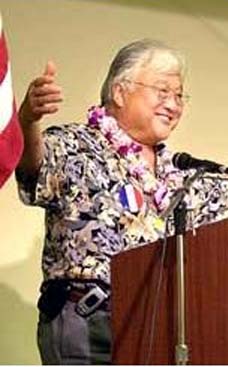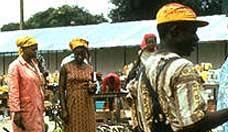
Perkins argues that the corporatocracy has developed gradually since World War II into a system that gives priority to corporate interests rather than human rights - and that the corporatocracy has increasingly exerted itself "as the single major influence on world economics and politics."
In "Confessions of an Economic Hit Man," RPCV John Perkins tells us how the United States keeps poor countries down.
The sinister side of U.S. biz
By Judie Kleinmaier
July 29, 2005
In "Confessions of an Economic Hit Man," John Perkins tells us how the United States keeps poor countries down.
There's no conspiracy, but insiders know how the game is played: Country X needs infrastructure. Consultants do a study, overstating the need. The World Bank (or similar international agency controlled by the U.S.) lends a huge amount of money to Country X. Company Y, a U.S. firm, gets the contract. Company Y provides the infrastructure at a premium price, often with environmental degradation as a byproduct. Country X gets needed infrastructure and in the process its leaders wind up rich, but the huge interest on the loans means that instead of using its money to help its citizens, each year it must pay millions in interest on the loans. And Country X never gets ahead.
"In the end," writes Perkins, "those leaders become ensnared in a web of debt that ensures their loyalty. We can draw on them whenever we desire - to satisfy our political, economic, or military needs."
This scenario is carried out by economic hit men - "highly paid professionals who cheat countries around the globe out of trillions of dollars," says Perkins. For a decade, he was one of them.
After serving in the Peace Corps in Ecuador in the late 1960s, he was hired by MAIN, an international consulting firm. Perkins reports that he learned early on how the game was played. A colleague refused to overstate a particular country's need for electricity. He was fired.
Likewise, the leaders of some Third World countries recognized the global pattern and decided they didn't want to build up huge debts. Two who did not play along were Jaime Roldos, president of Ecuador, and Omar Torrijos, president of Panama. Both died in fiery aircraft crashes in 1981.
"Their deaths were not accidental," Perkins writes. "They were assassinated because they opposed that fraternity of corporate, government, and banking heads whose goal is global empire."
Perkins adds that the Roldos crash "had all the markings of a CIA-orchestrated assassination."
Does he claim to have proof? No. Does that matter? No. Headlines in Latin America proclaimed "CIA Assassination." Whether that was the reality, it was the perception. And people in Latin America, like all people, base their opinions and actions on their perceptions.
In another chapter Perkins describes how the U.S. government, after the 1973 oil embargo, moved to ensure its oil supply by developing a closer relationship with Saudi Arabia. The negotiations led to the creation of the United States-Saudi Arabian Joint Economic Commission, which used Saudi petrodollars to hire U.S. firms to build up Saudi Arabia. As a consultant, Perkins worked on the plans:
"I always kept in mind the true objectives: maximizing payouts to U.S. firms and making Saudi Arabia increasingly dependent on the United States. It did not take long to realize how closely the two went together; almost all the newly developed projects would require continual upgrading and servicing, and they were so highly technical as to assure that the companies that originally developed them would have to maintain and modernize them. ... MAIN, Bechtel, Brown & Root, Halliburton, Stone & Webster and many other U.S. engineers and contractors would profit handsomely for decades to come."
The U.S. corporatocracy - government, corporate and banking interests - became so thick with Saudi officials, Perkins says, that the U.S. government looked the other way when Saudi Arabia became, in the words of a senior U.S. official quoted by U.S. News & World Report, " 'the epicenter' of terrorist financing."
In 1980 Perkins quit his job with MAIN. He writes that he had frequently wrestled with his conscience over what he was doing, but the money was hard to give up. He then worked as a freelance consultant and started a company to develop environmentally beneficial power plants.
He worked intermittently on a book about his experiences as an economic hit man. Finally, after the Sept. 11 terror attacks, he finished the book.
"I had to come clean about my life in a manner that would help people wake up to the fact of corporatocracy and understand why so much of the world hates us," Perkins writes.
Perkins argues that the corporatocracy has developed gradually since World War II into a system that gives priority to corporate interests rather than human rights - and that the corporatocracy has increasingly exerted itself "as the single major influence on world economics and politics."
This is a fascinating book. A Publishers Weekly review quoted on Amazon.com called it implausible, but I disagree. It's the sort of story that people say must be true because you couldn't make up something like that. It's a bit heavy on angst and overwritten to some extent, but it has a valuable point of view. It would be a good book for high school and college students to read.
E-mail: jkleinmaier@madison.com











